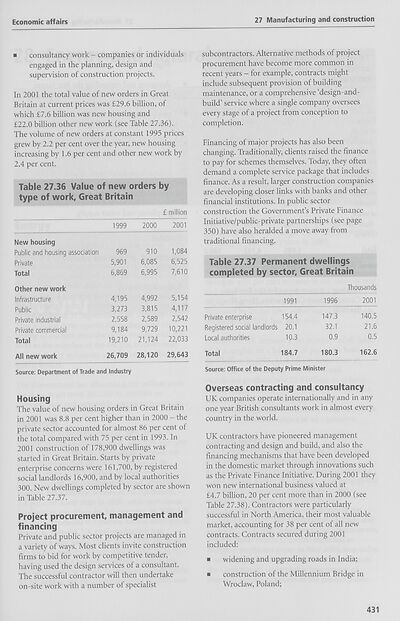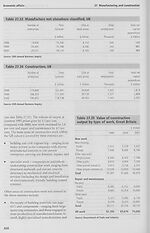Download files
Complete book:
Individual page:
Thumbnail gallery: Grid view | List view

Economic affairs
27 Manufacturing and construction
■ consultancy work - companies or individuals
engaged in the planning, design and
supervision of construction projects.
In 2001 the total value of new orders in Great
Britain at current prices was £29.6 billion, of
which £7.6 billion was new housing and
£22.0 billion other new work (see Table 27.36).
The volume of new orders at constant 1995 prices
grew by 2.2 per cent over the year, new housing
increasing by 1.6 per cent and other new work by
2.4 per cent.
Table 27.36 Value of new orders by
type of work. Great Britain
£ million
1999 2000 2001
New housing
Public and housing association
Private
Total
Other new work
Infrastructure
Public
Private industrial
Private commercial
Total
All new work
969 910 1,084
5,901 6,085 6,525
6,869 6,995 7,610
4,195 4,992 5,154
3,273 3,815 4,1 17
2,558 2,589 2,542
9,184 9,729 10,221
19,210 21,124 22,033
26,709 28,120 29,643
Source: Department of Trade and Industry
Housing
The value of new housing orders in Great Britain
in 2001 was 8.8 per cent higher than in 2000 - the
private sector accounted for almost 86 per cent of
the total compared with 75 per cent in 1993. In
2001 construction of 178,900 dwellings was
started in Great Britain. Starts by private
enterprise concerns were 161,700, by registered
social landlords 16,900, and by local authorities
300. New dwellings completed by sector are shown
in Table 27.37.
Project procurement, management and
financing
Private and public sector projects are managed in
a variety of ways. Most clients invite construction
firms to bid for work by competitive tender,
having used the design services of a consultant.
The successful contractor will then undertake
on-site work with a number of specialist
subcontractors. Alternative methods of project
procurement have become more common in
recent years - for example, contracts might
include subsequent provision of building
maintenance, or a comprehensive ‘design-and-
build’ service where a single company oversees
every stage of a project from conception to
completion.
Financing of major projects has also been
changing. Traditionally, clients raised the finance
to pay for schemes themselves. Today, they often
demand a complete service package that includes
finance. As a result, larger construction companies
are developing closer links with banks and other
financial institutions. In public sector
construction the Government’s Private Finance
Initiative/public-private partnerships (see page
350) have also heralded a move away from
traditional financing.
Table 27.37 Permanent dwellings
completed by sector. Great Britain
Thousands
1991
1996
2001
Private enterprise 154.4 147.3 140.5
Registered social landlords 20.1 32.1 21.6
Local authorities 10.3 0.9 0.5
Total 184.7 180.3 162.6
Source: Office of the Deputy Prime Minister
Overseas contracting and consultancy
UK companies operate internationally and in any
one year British consultants work in almost every
country in the world.
UK contractors have pioneered management
contracting and design and build, and also the
financing mechanisms that have been developed
in the domestic market through innovations such
as the Private Finance Initiative. During 2001 they
won new international business valued at
£4.7 billion, 20 per cent more than in 2000 (see
Table 27.38). Contractors were particularly
successful in North America, their most valuable
market, accounting for 38 per cent of all new
contracts. Contracts secured during 2001
included:
■ widening and upgrading roads in India;
■ construction of the Millennium Bridge in
Wroclaw, Poland;
431
27 Manufacturing and construction
■ consultancy work - companies or individuals
engaged in the planning, design and
supervision of construction projects.
In 2001 the total value of new orders in Great
Britain at current prices was £29.6 billion, of
which £7.6 billion was new housing and
£22.0 billion other new work (see Table 27.36).
The volume of new orders at constant 1995 prices
grew by 2.2 per cent over the year, new housing
increasing by 1.6 per cent and other new work by
2.4 per cent.
Table 27.36 Value of new orders by
type of work. Great Britain
£ million
1999 2000 2001
New housing
Public and housing association
Private
Total
Other new work
Infrastructure
Public
Private industrial
Private commercial
Total
All new work
969 910 1,084
5,901 6,085 6,525
6,869 6,995 7,610
4,195 4,992 5,154
3,273 3,815 4,1 17
2,558 2,589 2,542
9,184 9,729 10,221
19,210 21,124 22,033
26,709 28,120 29,643
Source: Department of Trade and Industry
Housing
The value of new housing orders in Great Britain
in 2001 was 8.8 per cent higher than in 2000 - the
private sector accounted for almost 86 per cent of
the total compared with 75 per cent in 1993. In
2001 construction of 178,900 dwellings was
started in Great Britain. Starts by private
enterprise concerns were 161,700, by registered
social landlords 16,900, and by local authorities
300. New dwellings completed by sector are shown
in Table 27.37.
Project procurement, management and
financing
Private and public sector projects are managed in
a variety of ways. Most clients invite construction
firms to bid for work by competitive tender,
having used the design services of a consultant.
The successful contractor will then undertake
on-site work with a number of specialist
subcontractors. Alternative methods of project
procurement have become more common in
recent years - for example, contracts might
include subsequent provision of building
maintenance, or a comprehensive ‘design-and-
build’ service where a single company oversees
every stage of a project from conception to
completion.
Financing of major projects has also been
changing. Traditionally, clients raised the finance
to pay for schemes themselves. Today, they often
demand a complete service package that includes
finance. As a result, larger construction companies
are developing closer links with banks and other
financial institutions. In public sector
construction the Government’s Private Finance
Initiative/public-private partnerships (see page
350) have also heralded a move away from
traditional financing.
Table 27.37 Permanent dwellings
completed by sector. Great Britain
Thousands
1991
1996
2001
Private enterprise 154.4 147.3 140.5
Registered social landlords 20.1 32.1 21.6
Local authorities 10.3 0.9 0.5
Total 184.7 180.3 162.6
Source: Office of the Deputy Prime Minister
Overseas contracting and consultancy
UK companies operate internationally and in any
one year British consultants work in almost every
country in the world.
UK contractors have pioneered management
contracting and design and build, and also the
financing mechanisms that have been developed
in the domestic market through innovations such
as the Private Finance Initiative. During 2001 they
won new international business valued at
£4.7 billion, 20 per cent more than in 2000 (see
Table 27.38). Contractors were particularly
successful in North America, their most valuable
market, accounting for 38 per cent of all new
contracts. Contracts secured during 2001
included:
■ widening and upgrading roads in India;
■ construction of the Millennium Bridge in
Wroclaw, Poland;
431
Set display mode to:
![]() Universal Viewer |
Universal Viewer | ![]() Mirador |
Large image | Transcription
Mirador |
Large image | Transcription
The item on this page appears courtesy of Office for National Statistics and may be re-used under the Open Government Licence for Public Sector Information.
| Britain and UK handbooks > UK: The official yearbook of the United Kingdom of Great Britain and Northern Ireland > 2003 > (481) |
|---|
| Permanent URL | https://digital.nls.uk/204929366 |
|---|
| Attribution and copyright: |
|
|---|---|
| Description | Three volumes of 'UK: The official yearbook of the United Kingdom of Great Britain and Northern Ireland', published annually by the Office of National Statistics from 2002-2005. |
|---|---|
| Shelfmark | GII.11 SER |
| Description | Three titles produced by the British Government from 1954-2005 describing 'how Britain worked'. They are: 'Britain: An official handbook' (1954-1998), 'Britain: The official yearbook of the United Kingdom' (1999-2001), and 'UK: The official yearbook of the United Kingdom of Great Britain and Northern Ireland' (2002-2005). These 50 reports provide an overview of Britain's economic, social and cultural affairs, its environment, international relations, and the systems of government. They give an impartial summary of government policies and initiatives, and explain how public services are organised. |
|---|---|
| Additional NLS resources: |
|

